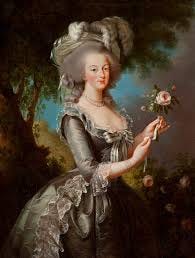
Perfection is a powerful lie.
In all my social media posts about women’s history, I can count on three types of commenters:
The “This never happened” guy
The “You’re wrong, get your facts straight” woman
The “Well, she did this terrible thing, so she doesn’t deserve to be celebrated” person. This is a combo of men and women.
Every damn time. The same comments.
I find this to be a fascinating case study in how society views women. Let’s get into it.
When discussing women’s history, we’re fighting a few battles. Everyone thinks they own their own history. By that, I mean everyone comes to the table with their own set of facts gathered over the years from various sources. But often what you’ve heard or maybe even read once or twice is wrong. Case in point:
Marie Antoinette:
This royal elicits a number of common reactions. A symbol of frivolity and excess. The face of aristocratic indifference with the uprising of the working class against the likes of this selfish queen. “Let them eat cake.”
Here’s the problem: people had it wrong. Really wrong. According to historians, the translation of the term was “Let them eat brioche” and there is no record of Marie Antoinette ever saying this. According to the History Channel, Marie Antoinette was charitable and understood the plight of the poor.
We know what we’ve been taught and what we’ve come across over the years. This doesn’t make it accurate. It makes it ours to hold and believe—and ours to re-evaluate if we so choose. Often, we don’t see how misogyny and propaganda shaped those ideas. The accepted belief that Napoleon was short, for example. He was above-average height for a man of the time, but his enemies wanted to cut him down, and so created a campaign to emasculate him. It worked so well we still use the term Napoleon Complex, two hundred years later.
My historical fiction Defying the Crown trilogy sent me down a two-year research rabbit hole about 17th century France, King Louis XIV, and Catholic/Protestant struggles.
History remembers the Sun King as progressive, artistic, and eccentric. He was all those things, but also personified excess and greed. He turned Versailles from a hunting lodge into the gilded extravagance it is today, entering war upon war and colonizing lands to fund his spending habits. And yet, the wife of the final Bourbon King (who couldn’t hold the throne as a woman) became the symbol of a hated monarchy.
They were both complicated figures, but Marie was vilified from the start. They held contradictions. They were products of their time and circumstance, and individuals who broke convention with society.
They were human.
And thus brings us to commenter #3. The expectation that women in history should be perfect or we shouldn’t celebrate them.
One of my favorite quotes is by the comedian Hannah Gadsby who said, “Men don’t have a monopoly on the human condition.” Women are complicated creatures. They’ve lived by a unique set of standards throughout history. Renaissance Italy forbade women from playing certain instruments because they would cause “unattractive facial expressions.” They couldn’t stand near windows lest they tempt men passing by. Living in this kind of world would inevitably lead to complicated choices.
Lola Montez:
This fourteen-year-old girl faced an arranged marriage with a sixty-year-old grandpa. She fled and married a young, handsome soldier. When he left her for another woman, she had no prospects. No family. No money. She couldn’t remarry as he would have had her arrested for bigamy (their separation was a strange agreement where they remained married).
What’s a girl to do? Whatever the hell she has to do is the correct answer.
Eliza became Lola, and she took up dancing—the scandalous kind. This brought her money and power, something this neglected Irish girl never had. Through various affairs, she found herself working as a courtesan, including with the King of Bavaria, who offered her a castle and political advisor position.
On my viral post about her, the number of commenters who called her a whore and me a whore and all women whores is astounding. The assumption that women should live by the rules of society, which would lead to being raped as an innocent kid is insanity to me. She did what she had to. She was human. She found a way to thrive—unconventionally.
But that is the problem, isn’t it?
Women aren’t allowed to be imperfect.
News flash. We are all imperfect and make mistakes as we learn along the way.
Women should hold some sort of superhuman strength to withstand pressure, right? We should be impervious to desire (sexual and personal), remaining virtuous, and yes… perfect.
People say I shouldn’t celebrate Ruth Bader Ginsburg because she stayed on through President Obama’s term. When I celebrate Eleanor Roosevelt, people say she failed to stop her husband from implementing Japanese Internment Camps. When I highlight Victoria Woodhull, the first woman on Wall Street, people argue that she supported eugenics. Don’t celebrate the suffragist movement because the right to vote was riddled with racism and flawed beliefs.
Guess what? All of this is true. Movements are flawed. Today’s approach to equality remains troubled. Feminist movements still fail to embrace intersectionality and progressive movements still center the white person’s savior complex. We are all flawed, even with good intentions. Does that mean we stop learning?
No. It means we keep reading. We keep growing.
People evolve. People grow and change. Eleanor Roosevelt didn’t support suffrage as a young woman during the Gilded Age. She knew what her family taught her. She grew to become one of the world’s most vocal proponents of women’s rights.
When we live in a country that celebrates Christopher Columbus, who was neither a hero nor a good guy, it’s hard to look past the criticism of women. Was Columbus brave? Sure. But rarely in history do we question if a white man need be good to be revered.
All we do is question whether women deserve praise.
As I write about women’s history, I recognize the humanity in these women. Their bravery, their struggles, their complicated flaws. But I’m trying to change a narrative. People don’t like change. Often, resistance is the first step to learning. In the words of Frank Underwood in the show House of Cards, “No one goes from a no to a yes without a maybe in between.”
People will resist, then hopefully, hold on to the idea until they’re ready to take it out and examine it. That’s their maybe. A tiny flicker of possibility and willingness to hear a different perspective. And if they don’t, that’s okay. Gloria Steinem says, “Let them go. Those aren’t your people.”
We should examine women’s history for what it is: a study in how humans survive in a world of restraints. For all our struggles, I’ve yet to meet a woman who wishes they’d been born a man. We love ourselves, despite how society has taught us to hate our bodies and voices. We know the strength we hold deep in our bones. That’s why I write these books and articles, so we can see that women before us have done it all. When we hear stories that show us it can be done, we finally believe it, and we know we aren’t alone.
To not know the history of who are is one of the greatest travesties of modern women. When they erase our stories, they control us. My world is about connecting us with a past that looks and sounds like us so we may empower the next generation of girls.
Thank you for being here.







Very interesting, especially the part about the comments you always receive.
So well said!